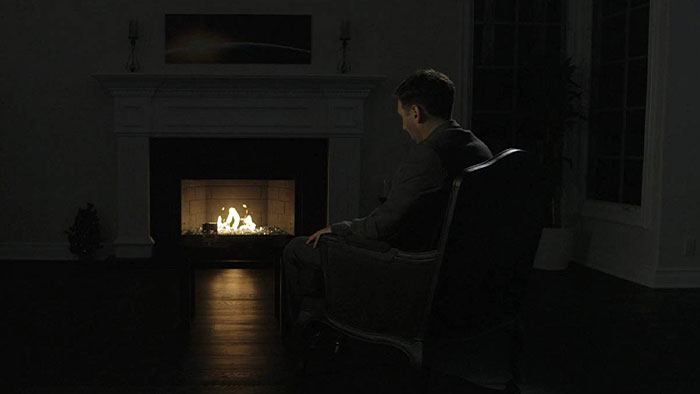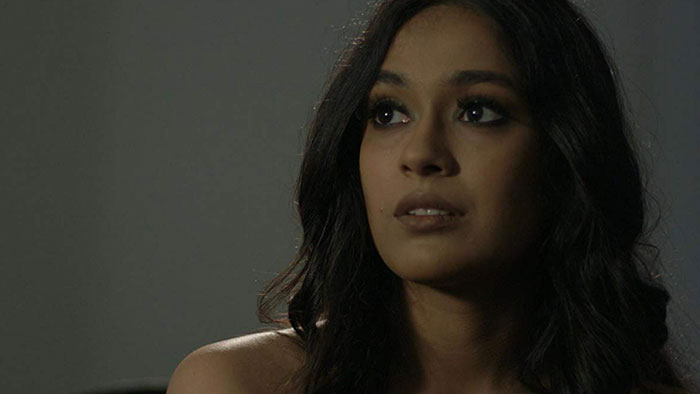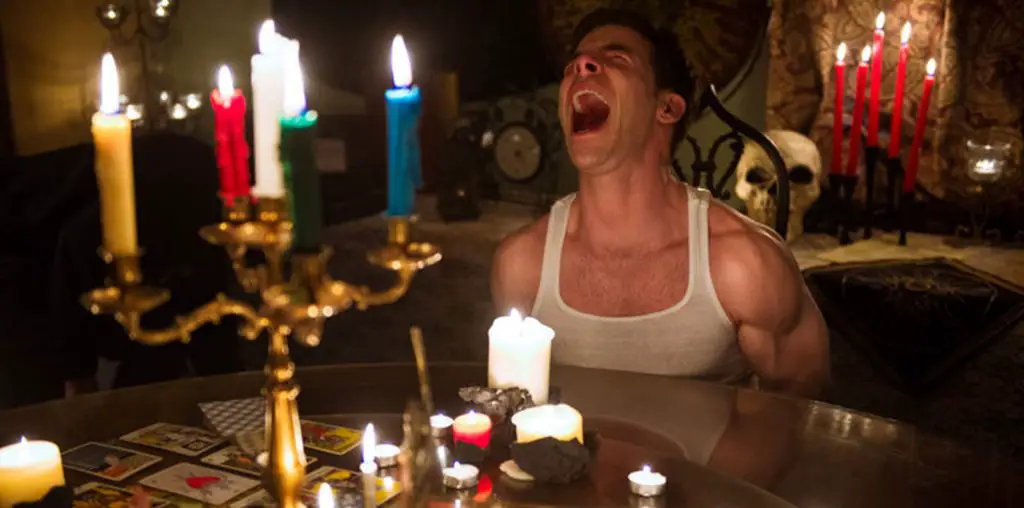
Don’t let The Bestowal‘s cosmic key art fool you. Speculative science fiction is one of my favorite genres, but Andrew de Burgh’s debut feature distills it to its bare-bones essence. His film takes place entirely within the confines of a small apartment. A more appropriate poster would’ve been that of an empty couch. Neither the filmmaker nor his two (and only) leads possess the gravitas to sustain our attention with just conversation. Imagine deliberating the origins of the universe and the possibility of an afterlife with your stoned friend. You’ll come close to picturing the experience of watching The Bestowal. De Burgh throws in suicide to the heady mix, a touchy subject that surely requires a more nuanced treatment.
Consider Jane Campion’s wildly underrated Holy Smoke! The film had two actors fill the screen for its feature running length: Kate Winslet as the brainwashed Ruth and Harvey Keitel as PJ, the man tasked with “deprogramming” her. The interplay between the two thespians, touching upon a slew of existential themes, was riveting to behold. Campion’s razor-sharp dialogue (and yes, the sight of a nude Winslet peeing herself), held us rapt for almost two hours. Andre de Burgh attempts a similar feat with his two-character, one-setting, existential, talky piece. Yet he’s no Jane Campion, and his actors – Sam Brittan and Sharmita Bhattacharya – are no Keitel and Winslet.
The pretentiousness starts with the film’s basic structure, split into extravagantly-titled chapters: it starts with “The Emancipation” and ends with “Another Paradise.” “Every day, it feels like my soul is getting drained out, bit by bit until there’s nothing left,” says Steven (Sam Brittan), a wealthy-but-depressed businessman on the verge of pulling the trigger. Just as he’s about to put an end to it all, a mysterious, beautiful young woman, who claims to be an inter-dimensional being – or, you know, Death (Sharmita Bhattacharya) – materializes next to him. She seems to know everything about Steven, claiming that “she’s been there all along.” When he asks her to go, she replies, “I’m not going to leave when your redemption is just around the corner.”

“…a version of Death visits millions of suicidal folks each year, trying to convince them to keep living, basically acting as their psychiatrist.”
It is revealed that a version of Death visits millions of suicidal folks each year, trying to convince them to keep living, basically acting as their psychiatrist. “If you travel and help others, your life will truly change,” she teaches. She tells Steven that there is an infinite number of planets, galaxies, and universes (aha), God is “more of an abstract entity than a celestial being” (right), and He is represented by “energy that manifests itself into good deeds” (got it). “When people commit suicide,” she continues, “they fall into this ironic cycle, where they are forced to live as ghosts for eternity.” This mumbo-jumbo goes on and on: greed is a “pill people take on a daily basis”; the system we live in is abhorrent and “capitalistic,” and a “red brush plant in the Eastern slopes of Nairobi” may show Steven the path to enlightenment. That latter bit marks the titular bestowal. Death then promises to visit him again in 20 years and disappears.
And so she does, 20 years later to the second, accurately remarking that he hasn’t aged a day. He’s “no longer fully human,” you see. “It’s the spirituality you’ve been endowed with,” she explains. Apparently, there are forces (read: the devil) that have been trying to destroy the human race for ages, but they are growing stronger. “People’s hearts are so delicate now,” she says, “they are easier to manipulate.” He recounts his own spiritual journey to her (why he would do that, if she’s an All-Knowing Being, eludes me). Steven is now a Guardian, protecting the world from Evil. He may or may not have fallen in love with Death. After another 30 minutes of dreadful chatter, Death revisits Steven again in 20 years, on his deathbed.
All of this pretty much happens on two chairs. The filmmaker’s attempts to get a lot of mileage out of a limited setting are futile. This wouldn’t even function as a theater play, mostly due to the leaden, on-the-nose dialogue. I’ll just recount the juicier tidbits: “You always have a choice in life. That’s what makes it so precious,” she says. “My mind won’t let me live in this world anymore,” he says. “When I died, I was turned into a manifestation of eternity,” she says. “Technology has made many people lose their basic ability for speech,” he says. “Happiness doesn’t come from making money,” she says. “Technology, money, capitalism… they’re the bane of human existence!” he says. “You have the soul of a life-force that transcends infinite dimensions,” she says.

“…tackles existential, cosmic issues and mixes the theological, the religious and the scientific…”
“It sounds somewhat contrived,” Death says of her own “spiel” at one point, and she nails it. At least the film is self-aware. Even the Roman times are brought up (“You can’t even imagine how bad the slaves were treated back then!” she says… And she’s absolutely right, we can’t.) Characters frequently start their sentences with “Like I said,” admitting that they are reiterating points, a.k.a. beating a dead horse. The acting is both wooden and overly earnest, especially from Brittan, who delivers his lines as if he’s just memorized them. Bhattacharya tries hard to pull off the enigmatic/alluring combo but ends up merely blank. Perhaps it was a deliberate choice – she used to feel emotions, after all, when she “lived on Earth as a human,” but has since then “transcended the human experience” (and compelling acting, it seems).
Andrew de Burgh tackles existential, cosmic issues and mixes the theological, the religious and the scientific with such reckless abandon, his reach far exceeds his grasp. It’s all delivered in monotone – the setting, the acting, the lighting – without saying anything substantial or novel. For the filmmaker to assume that his deliberations are worthy of our 90-minute investment is presumptuous, to say the least.
Perhaps the comparison to Holy Smoke! was a bit unfair. Campion and his cast were all seasoned professionals, after all, while this trio is relatively new to the cinematic scene. But then I think of Shane Carruth’s Primer, or James Ward Byrkit’s Coherence, or even Akash Sherman’s recent flawed-but-ambitious Clara – all amateur filmmakers, displaying a knack that’s simply absent from The Bestowal. More of a sub-standard, extended, filmed conversation than a full-fledged feature, it’s truly painful to sit through. A critic compared its existential musings to those of The Arrival, Annihilation and Interstellar – that absurd quote made me think harder than anything in the film.
"…"distills the genre to its bare-bones essence, taking place entirely within the confines of a small apartment.""



Awful…